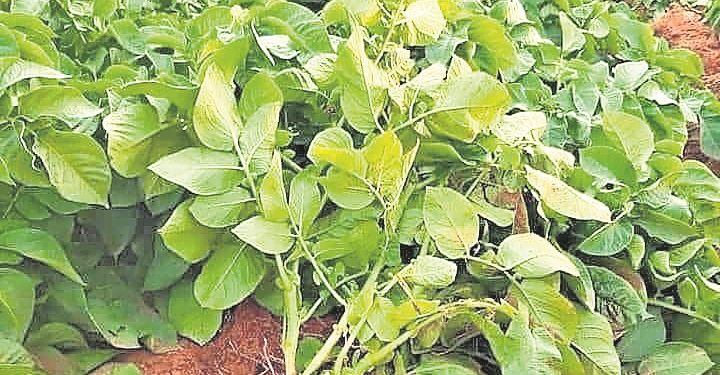NARENDRA RAUT, OP
Koraput: Potato growers across Koraput district are grappling with an unexpected crisis after Cyclone Montha left large portions of farmland underwater. The lingering effects of the storm have delayed harvesting and raised fears of rotting tubers, reduced quality, and financial losses. According to the Agriculture department, potatoes were cultivated on nearly 3,500 hectares under the kharif plan across major potato-producing blocks, including Dasmanthpur, Nandapur, Bandhugaon, Narayanpatana, Lamtaput, Semiliguda, Pottangi, and Laxmipur.
The crop had reached the harvesting stage, but continuous rainfall from the cyclone inundated large tracts of farmland, halting operations completely. For many small and marginal farmers who rely on potato cultivation as a key cash crop, the natural setback has been devastating. “We were ready to begin harvesting last week, but continuous rainfall filled our fields with water,” said Prakash Majhi, a farmer from Bandhugaon block. “The potatoes are still under the soil, but we can’t dig them out as the land is too wet. If this continues, the potatoes will begin to decay.” Farmers say the issue is not only the delay but also the moisture level in the soil, which can affect the quality of the tubers. Normally, harvesting is done when the soil is firm and dry enough to allow easy extraction without damaging the potatoes. Excess water reduces aeration, leading to fungal infections and a decline in both weight and storage quality. “Farmers usually harvest tuber crops when the temperature is conducive and the moisture content is low,” said Narendra Pradhan, convenor of the Koraput Krushak Kalyan Manch. “However, the recent cyclone brought rainfall to potato-growing areas, affecting the process. We fear loss of quality and productivity due to this natural calamity.” About 3,000 farmers procured subsidised potato seeds from the Odisha State Seeds Corporation (OSSC) under government assistance programmes this season. Many now worry that prolonged waterlogging will reduce returns and affect their ability to repay loans. Farmers also said they spent heavily on fertilisers, irrigation, and labour, expecting a good yield this year. “We had a healthy crop and were expecting strong returns,” said Ramesh Dora, a farmer from Nandapur. “But now, the tubers are lying under standing water. If it doesn’t dry up soon, we could lose much of our produce.”
Also Read: Nuapada: Turf war over Dholakia’s legacy
The Horticulture department has stepped in to assess the situation. The office of the Deputy Director of Horticulture, Koraput, has directed all block-level officers to visit affected fields, monitor conditions, and guide farmers on draining water through small channels before resuming harvest. Officials have also been asked to assist with post-harvest management once conditions improve. Deputy Director of Agriculture Sudam Charan Biswal said the situation remains under control. “We received reports of waterlogging in sporadic fields, but no major crop damage has been recorded. Overall, the crop condition is good, and we expect normal productivity this kharif season,” he said.
Agriculture experts, however, caution that even temporary waterlogging can impact yield if the soil remains wet for more than a week. They have urged farmers to take up immediate drainage measures to prevent tuber rot and disease once the rain stops. As weather conditions stabilise, farmers are anxiously waiting for the water to recede so they can resume harvesting. But uncertainty looms over the final output and quality of this year’s potato crop. The true extent of the loss will be known only after the fields dry up and harvesting resumes. For now, farmers’ hopes rest on clear skies — and a break from nature’s fury that would allow them to salvage what’s left of their hard-earned produce.
Orissa POST- Odisha’s No.1 Trusted English Daily






































